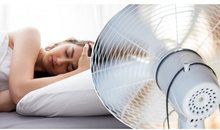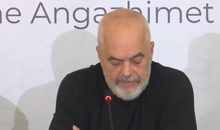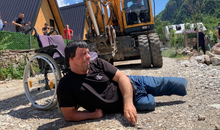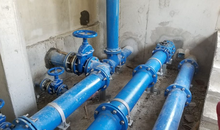
 Flash News
Flash News
Drug trafficking from Latin America to the EU, 7 arrests, 6 wanted
Farewell to Arben Anamali, the woman in pain: She pulled 7 tourists out of the lake, even took off her vest for them
Car burns in Belsh-Kuçova, family of five escapes unharmed
Skopje Mayor Attacked in the Face, Urgently Taken to Hospital
Fire in Pogradec, forest massif engulfed by flames
Is the air conditioner making you sick? A guide on how to get rid of neck and back pain

Summer heat can be tiring and make daily activities difficult, especially during work or a night off.
It is for this reason that many people use air conditioners to cool the space they are in, whether at home or at work.
But even though air conditioning can bring relief, more and more people are feeling the unpleasant effects of the cold, especially in the neck and back area.
Experts warn that cold air from air conditioning can cause muscle pain, and in the most sensitive people, it can worsen existing health problems.
Neck pain due to cold
It is very common for air conditioning to cause neck pain, known as cervical syndrome, and in some people, more serious upper back discomfort.
Such symptoms occur because the neck is more exposed to direct blows of cold air. Due to the sudden change in temperature, the muscles tighten, which causes stiffness, pain, dizziness and even headaches, which often occur as a concomitant symptom of cervical syndrome, which further worsens daily functioning.
Although pain caused by cold is usually muscular, people who suffer from arthritis or arthrosis should be especially careful. For them, cold can act as an additional irritating factor and intensify existing pain.
The most sensitive joints in the body are located precisely in the area of the spine, where muscles play a key role in maintaining proper posture.
When these muscles tighten due to the cold, they put extra pressure on the joints and can cause even more pain.
Ways to relieve pain
The first step is to avoid direct exposure to the cold air from the air conditioner. It is recommended to lightly cover your neck with a scarf or bandana, as well as increase the air conditioner temperature to a more comfortable level, in order to reduce thermal shock.
The following methods are useful in combating neck pain:
anti-inflammatory drugs (in consultation with a doctor)
gentle massage of the affected area
regular stretching of the neck and shoulder muscles
Osteopathic therapies aimed at muscle relaxation and establishing muscle balance
Massage can help, but it should be gentle. Sudden movements or excessive pressure can further irritate muscles that are already tense.
Gentle stretching is ideal, and osteopathic treatments that help relax muscles and balance the fascia can be an effective alternative.
Latest news




Illegal constructions in Theth, Tare: A reality tolerated for years
2025-07-11 21:12:31
Edi Rama as the owner of idiots
2025-07-11 20:53:09

What to do if you get stung by a jellyfish?
2025-07-11 20:37:00

Wanted by SPAK, former crime boss surrenders to Himara police
2025-07-11 20:22:31
Presentation with eagle and flag, former Partizan striker signs in Spain
2025-07-11 20:09:11
Mysterious discovery in space is likely 'oldest comet ever seen'
2025-07-11 19:59:28
Why we should forgive even when we are not forgiven
2025-07-11 19:48:51




New chiefs of police stations in Tirana, Shkodra and Kukës appointed
2025-07-11 18:55:31



Drug trafficking from Latin America to the EU, 7 arrests, 6 wanted
2025-07-11 18:07:47


Armed Forces join firefighters in Lura, fire still out of control
2025-07-11 17:32:05

State Department expected to lay off more than 1,300 employees
2025-07-11 17:07:10

Car burns in Belsh-Kuçova, family of five escapes unharmed
2025-07-11 16:51:22

Skopje Mayor Attacked in the Face, Urgently Taken to Hospital
2025-07-11 16:34:15
Health risks from hot nights, how to prevent them
2025-07-11 16:31:30

UN releases figures: At least 798 people have been killed at aid points in Gaza
2025-07-11 16:08:10
Tirana strengthens defense, signs former Aris Thessaloniki player
2025-07-11 16:00:08

Fire in Pogradec, forest massif engulfed by flames
2025-07-11 15:41:58
Incident in Theth, Several people throw Molotov cocktails at IKMT's fire trucks
2025-07-11 15:31:49
30 massage centers and nightclubs closed in Kosovo
2025-07-11 15:23:48

Rama as a curse to his servants!
2025-07-11 15:02:54


From Venezuela to practice prostitution in Vlora, 3 girls under investigation
2025-07-11 14:30:44
High-risk young man arrested in Fushë Kuqe (NAME)
2025-07-11 14:17:52
Iranian Nobel Peace Prize winner receives death threats from Tehran
2025-07-11 14:08:57
Seven victims buried on 30th anniversary of Srebrenica genocide
2025-07-11 13:58:04
Dinners after 8:00 PM harm the body and sleep, what the study shows
2025-07-11 13:56:27

The question is not "how many there are", but who are the "advisors"...?
2025-07-11 13:40:09

Gramsh/ Landslide, 58-year-old dies
2025-07-11 13:27:31

Anti-drug action in Shkodra, who is the former police officer wanted by SPAK
2025-07-11 13:11:40

SPAK action in Shkodra, 13 arrest warrants issued, including police officers
2025-07-11 12:53:55
Requests freedom, date set for review of Meta's appeal
2025-07-11 12:42:40

Albania's anti-disinformation strategy could undermine free media
2025-07-11 12:26:14


Dervish's Irony: Why are 30 advisors few for a water supply director?
2025-07-11 11:58:20



Rama's ultimatum: On Monday, all heads of administrative units must be dismissed
2025-07-11 11:05:59
Fires in the country, 4 fires still active, what is the situation?
2025-07-11 10:56:23
Government irony: Rama strips Dredha of power, then demands law and order
2025-07-11 10:49:10
German media: Vlora Airport 'kills' one of Europe's largest wetlands!
2025-07-11 10:37:46

Amid the Alps in Theth, the law punishes even those who try to respect it
2025-07-11 10:14:16
Wanted for theft, 26-year-old arrested in Durrës
2025-07-11 10:03:29
After the dismissals, Rama gathers the mayors in Durrës
2025-07-11 09:42:29
Released on bail, Salianji appears before the Probation Service
2025-07-11 09:34:28

Haxhi Qamil Rama and the directors of the Municipalities!
2025-07-11 09:21:35
30 years since the Srebrenica massacre in Bosnia and Herzegovina
2025-07-11 09:10:52

From rhetoric to brandy, POLITICO: 9 things Nigel Farage can do in Albania
2025-07-11 08:53:35
Trump announces 35% tariffs on Canadian goods
2025-07-11 08:39:29
Foreign exchange, how much foreign currencies are sold and bought today
2025-07-11 08:24:25

Horoscope, what do the stars have in store for you today?
2025-07-11 07:59:39
Sun and high temperatures, weather forecast
2025-07-11 07:41:09
Morning Post/ In 2 lines: What mattered yesterday in Albania
2025-07-11 07:20:14
Zhupa: In Theth, some Austrian strategic investors want the empty area
2025-07-10 22:57:08
Malltezi: SPAK admits, we are in a process that began with Balla's false report
2025-07-10 22:34:16

Si të çliroheni nga bllokimet emocionale me anë të ushtrimeve
2025-07-10 21:57:24

Lala: Veliaj wanted to return as mayor
2025-07-10 21:40:46

VIDEO/ Brawl in Bolivian parliament, deputies physically clash
2025-07-10 21:20:30


Albania experienced one of the longest heat waves of the last decade
2025-07-10 21:01:09

The Government approves new procedures for declaring residence in e-Albania
2025-07-10 20:39:32

Koka: Northerners will not forget Edi Rama's racist operation in Theth
2025-07-10 20:18:24
